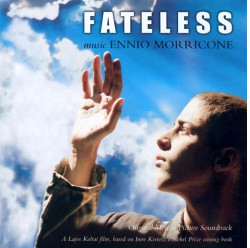主页--->m-comment-000--->mb-comment-012-111
|
电脑版 |
|||||||||||||||||||||||||||||||||||||||||||||||||||||||||||||
布罗克斯顿评说莫里康内 MB-012-111 |
||||||||||||||||||||||||||||||||||||||||||||||||||||||||||||||
FATELESS (SORSTALANSÁG) – Ennio Morricone (命运无常) |
||||||||||||||||||||||||||||||||||||||||||||||||||||||||||||||
FA0402 FATELESS (SORSTALANSÁG) (命运无常) |
||||||||||||||||||||||||||||||||||||||||||||||||||||||||||||||
作者 乔纳森·布罗克斯顿 (Jonathan Broxton) |
||||||||||||||||||||||||||||||||||||||||||||||||||||||||||||||
ENNIO MORRICONE 评论,第12部分 012-111 |
||||||||||||||||||||||||||||||||||||||||||||||||||||||||||||||
 |
||||||||||||||||||||||||||||||||||||||||||||||||||||||||||||||
FATELESS (SORSTALANSÁG) – 埃尼奥·莫里康内2006年1月6日
乔纳森·布罗克斯顿(Jonathan Broxton)的原始评论 导演拉霍斯·科尔泰(Lajos Koltai)的电影《命运无常》(Sorstalanság)终于晚了近一年才在北美上映,自2005年<>月首次上映以来,该片在欧洲的艺术和电影节上大受欢迎。这是一部历史剧,改编自诺贝尔奖获得者伊姆雷·克尔特斯关于大屠杀期间匈牙利犹太人的半自传体小说,由马塞尔·纳吉饰演久里·科夫斯,一个来自布达佩斯的年轻犹太男孩,他在去打仗的途中被从公共汽车上拉下来,被送往可怕的布痕瓦尔德集中营,在那里他必须忍受各种可怕的经历和恶劣的生活条件才能生存。 预算超过12万美元,《命运无缘》是有史以来最昂贵、最雄心勃勃的匈牙利电影之一。导演科尔泰在好莱坞最著名的电影摄影师,在30年的职业生涯中曾与伊斯特万·萨博和朱塞佩·托纳托雷等导演合作。《命运无常》是他的导演处女作。不出所料,鉴于该项目的声望,科尔泰求助于欧洲最受尊敬和尊敬的作曲家之一:埃尼奥·莫里康内(Ennio Morricone),他写了2005年的第七首乐曲。考虑到他年事已高(去年78月年满500岁),莫里康内继续多产的事实令人震惊。同样令人震惊的是,尽管他在 45 年的职业生涯中写了 500 多首乐谱,但他并没有固步自封,也没有简单地走向退休。2005 年,Fateless 获得了欧洲电影奖提名,他的作品获得了电影音乐界当之无愧的赞誉。 在电影界,人们已经接受的是,处理大屠杀这一巨大事件的电影被美感所强调:令人震惊的大规模人类苦难的视觉图像与极其优雅和抒情的音乐并置,以某种方式使悲剧更加悲惨,恐怖更加可怕,情感影响更加深刻。多年来,从约翰·威廉姆斯(John Williams)到 乔治·德勒鲁(Georges Delerue)的作曲家都了解了美丽与痛苦之间的这种联系,而埃尼奥·莫里康内(Ennio Morricone)这一次并没有逆势而上。他对集中营生活的音乐描绘侧重于这些地方盛行的希望,人类如何找到一种方法来保护自己免受周围世界的堕落,以及即使在最黑暗的时刻,光明如何以某种方式占上风。 任何熟悉莫里康内经典的人都会知道,当我说《Fateless》是他旋律风格的一个经典例子时,会发生什么:在听《Fateless》的主题曲时,有《Once Upon a Time in America》、《The Mission》的回声,以及他被拒绝的《What Dreams May Come》的配乐,这是专辑的结尾。最引人注目的线索之一是“Return to Life”,它以管风琴开始,切换到双簧管独奏,进入完整的合唱团,最后以精湛的 Lisa Gerrard 人声结束,所有这些都由一个横扫的弦乐部分支持。在《关于孤独》中,它的概括之一是微妙的美丽。 是的,我说丽莎·杰拉德 (Lisa Gerrard)。《Fateless》最有趣的地方之一是莫里康内决定让丽莎 杰拉德 (Lisa Gerrard) 扮演埃达·德尔·奥索(Edda dell'Orso)在之前的配乐中出色地完成的角色——提供无词的人声。杰拉德为许多曲目贡献了她丰满、一眼就能认出的声音,包括飙升的“A Song”和几乎教会的“A Voice from the Inside”。那些通过她与汉斯·季默(Hans Zimmer)的合作或她的独奏配乐熟悉她作品的人可能会惊讶于她的声音为这首乐谱带来的广度、情感深度和古典风格。她的表演无疑是亮点。 乐谱的其余部分延续了类似的脉络:对战争、生命、死亡和救赎的本质进行了尊重、庄严但又完全美丽的反思。其他线索因其一些乐器选择而引人注目:在“回归生活”结束时首次短暂出现的呼吸排笛在“悲剧的开始”中再次出现,以及“回归和记住”,其中还出人意料地演奏了匈牙利最流行的乐器,cimbalom。“The Field”是一首更具戏剧性、紧迫感的作品,铜管水平有所提高;《Home Again》是一首柔和、田园、充满憧憬的钢琴和双簧管二重奏,同样由弦乐伴奏;“心理破坏”是军鼓和颤音弦乐的巧妙威胁组合,主旋律的铜管演奏刚刚在阴暗中窥视。 难怪埃尼奥·莫里康内(Ennio Morricone)在他的同时代人中如此受人尊敬,并继续被引用为世界各地作曲家的灵感来源。他的职业生涯不乏开创性,他在旋律、配器和情感方面的天赋有时非常令人惊讶。《命运无常》让我们想起了为什么他受到如此高的尊重,但同样也提醒我们,好莱坞一直没有给他高质量的项目来配乐,或者将他的独特性限制在人口统计学的范围内。我敢说,莫里康内在欧洲工作更快乐,尽管他年事已高,但他没有放缓的迹象。在任何人的估计中,Fateless 都是年度最佳得分之一,也是 2006 年最高荣誉的早期竞争者。 评分: ****1/2 曲目列表:
片长:45分05秒 EMI 音乐 7243-860331-2-3 (2005) 音乐由埃尼奥·莫里康内(Ennio Morricone)作曲和指挥。由匈牙利广播乐团和合唱团演出。埃尼奥·莫里康内(Ennio Morricone)的编排。音乐独奏家乌尔里希·赫肯霍夫(Ulrich Herkenhoff)、艾格尼丝·萨卡利(Agnes Szakaly)和卢多维科·富尔奇(Ludovico Fulci)。丽莎·杰拉德(Lisa Gerrard)的特别声乐表演。由法比奥·文丘里(Fabio Venturi)录制和混音。专辑由埃尼奥·莫里康内(Ennio Morricone)制作。 |
||||||||||||||||||||||||||||||||||||||||||||||||||||||||||||||
2006.1.6 |
||||||||||||||||||||||||||||||||||||||||||||||||||||||||||||||
|
| ||||||||||||||||||||||||||||||||||||||||||||||||||||||||||||||
以下是原文
| ||||||||||||||||||||||||||||||||||||||||||||||||||||||||||||||
ENNIO MORRICONE REVIEWS, Part 12-111 |
||||||||||||||||||||||||||||||||||||||||||||||||||||||||||||||
FATELESS (SORSTALANSÁG) – Ennio MorriconeJanuary 6, 2006
Original Review by Jonathan Broxton Director Lajos Koltai’s film Fateless (Sorstalanság) has finally reached North America cinemas almost a year late, having been an art house and film festival hit across Europe following its initial release in February 2005. A historical drama based on Nobel laureate Imre Kertesz’s semi-autobiographical novel about Hungarian Jews during the Holocaust, it stars Marcell Nagy as Gyuri Köves, a young Jewish boy from Budapest who is pulled from a bus on his way to a war labour job and sent to the terrible Buchenwald concentration camp, where he must endure all manner of horrific experiences and harsh living conditions just to survive. With a budget of over $12m, Fateless is one of the most expensive and ambitious Hungarian films ever made. Director Koltai is most famous in Hollywood as a cinematographer, having worked with directors such as István Szabó and Giuseppe Tornatore in a 30-year career. Fateless is his directorial debut. Unsurprisingly, given the prestigious nature of the project, Koltai turned to one of Europe’s most revered and respected composers to write the score: Ennio Morricone, writing his seventh score of 2005. Considering his advancing years (he turned 78 last November), the fact that Morricone continues to be prolific is nothing short of astounding. It’s also astounding that, despite having written over 500 scores in a 45-year career, he is not resting on his laurels or simply coasting towards retirement. Fateless was nominated for a European Film Award in 2005, as has been the recipient of a great deal of well-deserved praise from the film music world for his work. It’s become accepted within the cinematic world that movies which deal with events on the monumental scale of the Holocaust are underscored with beauty: the juxtaposition of shocking visual imagery of mass human suffering with music of immense grace and lyricism somehow makes the tragedy more tragic, the horror more horrific, and the emotional impact more deeply felt. Over the years, composers from John Williams to Georges Delerue have understood this connection between beauty and misery, and Ennio Morricone for once does not buck the trend. His musical depiction of life in a concentration camp focuses on the hope that prevails in these places, on the way in which humanity finds a way to shield itself from the depravity of the world around them, and how, even in the darkest moments, brightness somehow prevails. Anyone familiar with Morricone’s canon will know what to expect when I say that Fateless is a classic example of his melodic style: there are echoes of Once Upon a Time in America, The Mission, and his rejected score for What Dreams May Come when listening to Fateless’s main theme, which bookends the album. One of the most remarkable cues is “Return to Life”, which begins with a pipe organ, switches to an oboe solo, segues into a full choir, and ends with a superb Lisa Gerrard vocal, all backed by a sweeping string section. One of it’s recapitulations, in “About Solitude”, is subtly beautiful. Yes, I said Lisa Gerrard. One of the most interesting things about Fateless is Morricone’s decision to have Gerrard take on the role which Edda dell’Orso has so wonderfully fulfilled in previous scores – the provision of wordless vocals. Gerrard contributes her lush, immediately-recognisable voice to a number of tracks, including the soaring “A Song” and the almost ecclesiastical “A Voice from the Inside”. Those familiar with her work via her collaborations with Hans Zimmer, or her solo scores, may be surprised at the range, depth of emotion, and classical style her voice brings to this score. Her performances are definite highlights. The rest of the score continues in a similar vein: respectful, solemn, but wholly beautiful reflections in the nature of war, life, death, and redemption. Other cues are notable for some of their instrumental choices: the breathy pan flute which first appeared briefly at the end of “Return to Life” reappears during “The Beginning of the Tragedy”, and “To Return and Remember”, which also features an unexpectedly jaunty performance of that most Hungarian of instruments, the cimbalom. “The Field” is a more dramatic, urgent piece with an increased level of brass; “Home Again” is a soft, pastoral, wistful duet for piano and oboe, again backed by strings; “Psychological Destruction” is a clever menacing combination of snare drums and tremolo strings, with a brass performance of the main theme just peeking through the gloom. It really is no wonder that Ennio Morricone is so revered amongst his contemporaries, and continues to be cited as an inspiration for composers across the world. His career has nothing been short of groundbreaking, and his gift for melody, orchestration and emotion is at times quite astonishing. Fateless reminds us of why he is held in such high esteem, but equally reminds us of what Hollywood is missing out on by continually failing to give him quality projects to score, or by constraining his uniqueness into the confines of demographics. I daresay Morricone is happier working in Europe, and shows no sign of slowing down, despite his advancing years. Fateless is one of the scores of the year in anyone’s estimation, and an early contender for the top honours of 2006. Rating: ****½ Track Listing:
Running Time: 45 minutes 05 seconds EMI Music 7243-860331-2-3 (2005) Music composed and conducted by Ennio Morricone. Performed by The Hungarian Radio Orchestra and Chorus. Orchestrations by Ennio Morricone. Featured musical soloists Ulrich Herkenhoff, Agnes Szakaly and Ludovico Fulci. Special vocal performances by Lisa Gerrard. Recorded and mixed by Fabio Venturi. Album produced by Ennio Morricone. |
||||||||||||||||||||||||||||||||||||||||||||||||||||||||||||||
Jan. 6, 2006 |
||||||||||||||||||||||||||||||||||||||||||||||||||||||||||||||
在线音乐试听 |
||||||||||||||||||||||||||||||||||||||||||||||||||||||||||||||
|
||||||||||||||||||||||||||||||||||||||||||||||||||||||||||||||
 |
||||||||||||||||||||||||||||||||||||||||||||||||||||||||||||||
Jon 是一位电影音乐评论家和记者,自 1997 年以来一直担任全球最受欢迎的英语电影音乐网站之一 Movie Music UK 的编辑和首席评论员,并且是国际电影音乐评论家协会 (IFMCA) 的主席。在过去的 20多 年中,Jon 撰写了 3,000 多篇评论和文章,并进行了多次作曲家采访。在杂志刊物方面,乔恩曾为《电影配乐月刊》、《原声带杂志》和《电影音乐》等出版物撰写评论和文章,并为普罗米修斯唱片公司的两张经典 Basil Poledouris 配乐专辑《Amanda》和《Flyers / Fire on the Mountain》撰写了衬垫注释。他还为汤姆·胡佛 (Tom Hoover) 于 2011 年出版的《Soundtrack Nation: Interviews with Today's Top Professionals in Film, Videogame, and Television Scorering》一书撰写了一章。在1990年代后期,乔恩是伦敦皇家爱乐乐团的电影音乐顾问,并与他们合作拍摄了约翰·德布尼(John Debney)的音乐电影《相对价值》(Relative Values)和奥利弗·海斯(Oliver Heise)的音乐《佛陀的指环》(The Ring of the Buddha),以及与兰迪·纽曼(Randy Newman)合作的一系列音乐会。2012年,乔恩在波兰克拉科夫举行的第五届年度电影音乐节上担任“电影节学院”主席。他是作曲家和作词家协会的成员,该协会是作曲家、作词家和词曲作者从事电影、电视和多媒体工作的首要非营利组织。 |
||||||||||||||||||||||||||||||||||||||||||||||||||||||||||||||
2023.12.20 |
||||||||||||||||||||||||||||||||||||||||||||||||||||||||||||||
2023 手机版 |
||||||||||||||||||||||||||||||||||||||||||||||||||||||||||||||
|
||||||||||||||||||||||||||||||||||||||||||||||||||||||||||||||













